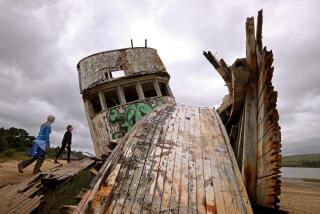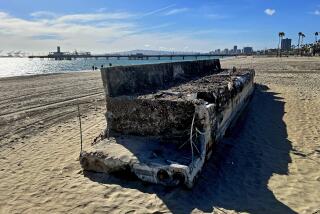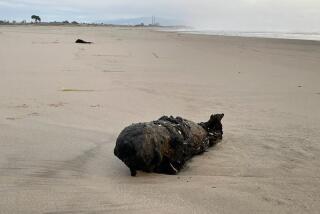Ballona Creek trash interceptor damaged during storms but will be fixed soon

As winter storms pounded the West Coast, the crews operating the Ballona Creek Trash Interceptor 007 saw the extreme conditions as a test for the solar-powered waste collection system.
Now that the skies have cleared, the results have become apparent: The interceptor has collected significant amounts of floating trash but also has been seriously damaged.
According to data from the Los Angeles County Department of Public Works, the interceptor has collected more than 42.5 tons of trash since its installation in October.
Interceptor 007 is one of a handful of trash collectors developed by the Dutch nonprofit the Ocean Cleanup. The organization is funded mostly from private donors, a spokesman told The Times. Its mission is to remove 90% of all floating plastic in the world’s oceans by 2040.
In Los Angeles, the goal of the interceptor is to prevent street trash from being carried out into the ocean, where it can pollute beaches, harm wildlife and end up as part of the Great Pacific Garbage Patch.
On Jan. 9, during stormy weather, “wave action caused a tear in the north boom,” said Kerjon Lee, a spokesman for the Public Works Department, referring to one of the device’s two nets that extend from the vessel to the shore and physically block trash from flowing out to the ocean.
“The boom became entangled with one of the mooring lines,” Lee continued. Mooring lines connect a vessel to a stationary point on the shore to prevent it from moving.
Crews assessed the damage and along with the manufacturer determined that the boom could not be repaired, he said. The Public Works Department and the Ocean Cleanup are in the process of having a new boom delivered.
The vessel itself was unharmed, and “continues to be able to harvest trash,” which floats down the south side of the jetty, according to Lee. Objects flowing north of the vessel will make it out to sea unhindered until a new boom is installed in the next two to three weeks.
The good news lies in the forecast. No major storms are forecast in the next few weeks, said Lee, which should allow crews to install the new boom and have the interceptor ready for the “last few months of winter storms.”
More to Read
Sign up for Essential California
The most important California stories and recommendations in your inbox every morning.
You may occasionally receive promotional content from the Los Angeles Times.











